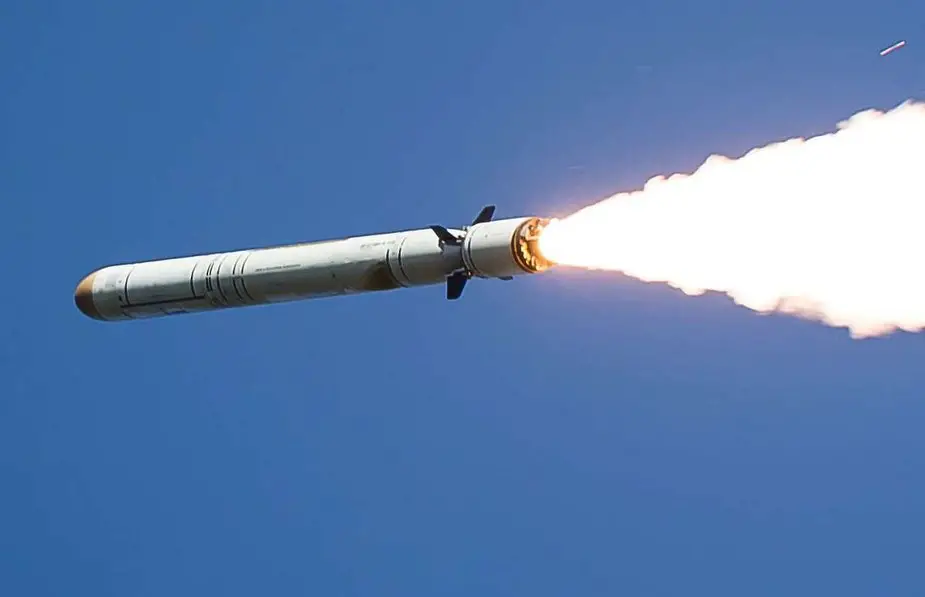Breaking news
Russia has more SSC-8 cruise missiles than expected, with conflictual range.
Russia has more SSC-8 cruise missiles than expected so far, reports the German weekly Frankfurter Allgemeine Sonntagszeitung (FAZ) on Sunday, citing an unnamed source in Western intelligence. NATO asserts that such weapons violate the Intermediate-Range Nuclear Forces (INF) Treaty, a disarmament agreement of 1987 from which the US and Russia claimed to withdraw last week. Washington has long accused Moscow of trampling this pact.

Russian SSC-8 cruise missile (Picture source: Russian MoD)
The German newspaper FAZ argues that in addition to two known locations where missiles and battalions are stationed - at a launch pad at Kapoustin Iar, in southern Russia, and Yekaterinburg - there would be two other places equipped with these missiles. : Mozdok in North Ossetia and Shuya near Moscow.
Each of the four battalions would have four wheeled launchers, each carrying four missiles, adds the German media. This brings to 64 SSC-8 missiles in Russia's possession, which can be armed with conventional or nuclear warheads. This type of missile has a range of 2,350 kilometers. With a conventional warhead of 500 kilos, the range is 2,000 kilometers.
The intermediate-range nuclear forces treaty between the US and Russia prohibits this type of development and possession of missiles with a range of 500 to 5,500 kilometers. Russia claims that these missiles have a range of only 480 kilometers. With these missiles in their current positions, eastern and northern Europe are in range of Russian fire, according to FAZ, which adds that by moving them, all of Europe can be threatened, with the exception of Portugal.
Russia had already, on September 2, 2015, conducted one more test of the ground-launched cruise missile that the United States claims violates the 1987 INF Treaty. the US designation is the “SSC-X-8.” This missile is probably designated 9M729. There was a Russian announcement by GosNIIP, the design bureau that builds guidance for cruise missiles, that Russia completed state acceptance trials of the “ground-based system 9M728, 9M729 and its modernized version.” The 9M728 is the Iskander cruise missile (it is also called the R500 — the name of the missile is different from its GRAU number.) The way Russian GRAU numbers work is formulaic — the 9M means it is an Army missile. That means the 9M729 is also for Iskander or a new launcher that we have yet to see. Let’s presume that the 9M728 is a reduced-range version of the 9M729 — an INF-compliant version of its bigger brother. That’s not hard to believe — Russian officials have long said they could extend the range of the cruise missile for Iskander beyond 500 km with little difficulty; their confidence was probably rooted in some evidence.
The SSC-8 is based on the Novator RK-55 Relief (NATO code: SSC-X-4 'Slingshot'; GRAU: 3K12), a Soviet land-based/submarine-launched cruise missile. It was about to enter service in 1987, when such weapons were banned under the Intermediate-Range Nuclear Forces Treaty. A version launched from submarine torpedo tubes, the S-10 Granat (SS-N-21 'Sampson'; GRAU: 3K10), has apparently been converted to carry conventional warheads and continues in service to this day. The Russian Federation was reported to have deployed the derivative SS-CX-7/SS-CX-8 systems on February 14, 2017. The RK-55 is very similar to the air-launched Kh-55 (AS-15 'Kent') but the Kh-55 has a drop-down turbofan engine and was designed by MKB Raduga. Both have formed the basis of post-Cold-War missiles, in particular the Sizzler which has a supersonic approach phase.
























